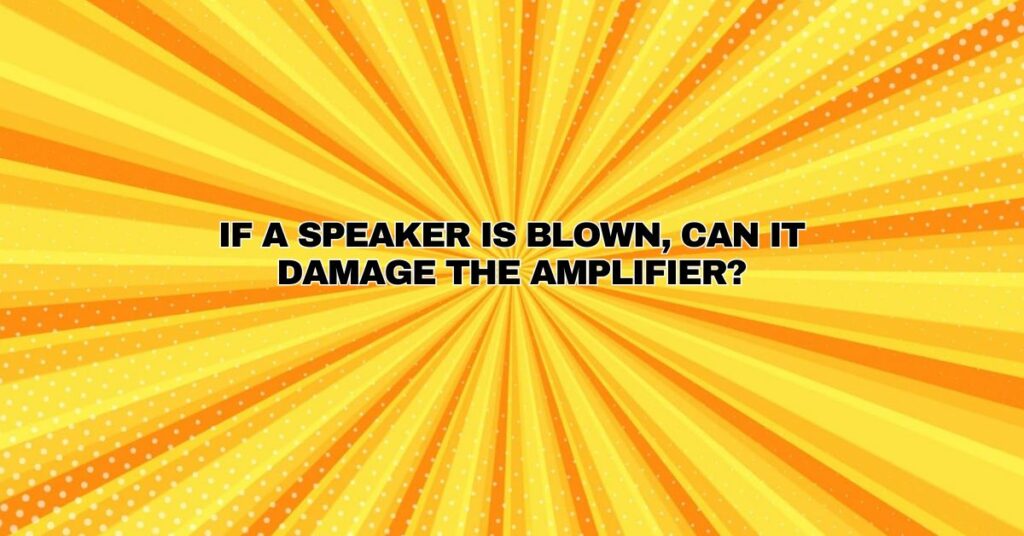In the world of audio equipment, the relationship between speakers and amplifiers is a critical one. When a speaker malfunctions or is damaged, it can raise concerns about its potential impact on the accompanying amplifier. One common question is whether a blown speaker can damage the amplifier. In this comprehensive article, we will explore the dynamics between speakers and amplifiers, dissect the concept of a “blown” speaker, and assess whether such speaker issues can indeed damage amplifiers.
Understanding the Speaker-Amplifier Relationship
Before we delve into the specifics of speaker damage and its consequences for amplifiers, it’s essential to grasp the symbiotic relationship between these two components:
- Amplifiers: Amplifiers are responsible for boosting the low-level audio signals from a source, such as a music player or preamplifier, to a level suitable for driving speakers. Amplifiers provide the necessary power to create sound from speakers.
- Speakers: Speakers are the final link in the audio chain. They convert the electrical signals received from amplifiers into audible sound. Speakers consist of various components, including the voice coil, cone, and magnet, which work together to produce sound.
What Does It Mean for a Speaker to Be “Blown”?
The term “blown speaker” is often used colloquially to describe a damaged or malfunctioning speaker. However, it can encompass several issues, including:
- Torn or Damaged Cone: Physical damage to the speaker’s cone can affect sound quality. Tears or punctures may lead to distortion and a reduction in audio fidelity.
- Damaged Voice Coil: The voice coil is a crucial part of a speaker. When damaged, it can lead to a variety of issues, including overheating and electrical failure.
- Distorted Sound: Speakers can produce distorted sound due to a variety of issues, such as a misaligned voice coil, magnet problems, or other internal damage.
- Reduced Sensitivity: A “blown” speaker may have a reduced sensitivity to audio signals, requiring more power to produce the same volume.
Can a Blown Speaker Damage an Amplifier?
The notion that a blown speaker can damage an amplifier is a common misconception. In reality, amplifiers are less likely to be damaged by a malfunctioning or damaged speaker. Amplifiers are designed to provide power to speakers and are equipped with protective mechanisms to prevent significant damage in the event of adverse conditions.
However, while a blown speaker is unlikely to directly harm an amplifier, it can indirectly affect the amplifier in several ways:
- Overheating: A damaged or malfunctioning speaker may draw more power from the amplifier to produce the same volume. This can lead to amplifier overheating, potentially affecting its long-term reliability.
- Reduced Audio Quality: A blown or damaged speaker may produce distorted or poor-quality sound. While this doesn’t harm the amplifier, it can certainly impact the overall audio experience.
- Inefficient Power Delivery: Inefficient speakers may not efficiently convert electrical signals into sound, which can place additional strain on the amplifier, affecting its efficiency.
Preventing Amplifier Damage from Blown Speakers
To minimize the risk of amplifier issues associated with blown or damaged speakers, consider the following:
- Regular Maintenance: Inspect your speakers for signs of damage or wear. Address any issues promptly to prevent further damage.
- Adequate Power Matching: Ensure that your amplifier’s power output matches the speaker’s specifications. Underpowering or overpowering speakers can lead to issues.
- High-Quality Components: Invest in reputable, well-matched components for your audio system, including amplifiers and speakers. Quality components are less likely to introduce problems.
- Monitor Volume Levels: Avoid excessive volume levels, which can strain both the speakers and the amplifier. Maintaining reasonable volume levels can extend the life of both components.
Conclusion
The idea that a blown speaker can directly damage an amplifier is a myth. While amplifier protection mechanisms can mitigate the risk, it is crucial to address speaker issues to maintain sound quality and overall system efficiency. Regular maintenance, proper power matching, and careful monitoring of volume levels can ensure a harmonious and long-lasting relationship between speakers and amplifiers. Understanding the roles and limitations of each component in your audio system is essential for optimizing performance and longevity.


